
Indicator scoreboard
EMU - December seasonally adjusted industrial output dropped 1.5 percent and was down 0.5 percent when compared with last year. Output dropped in all sectors except energy.
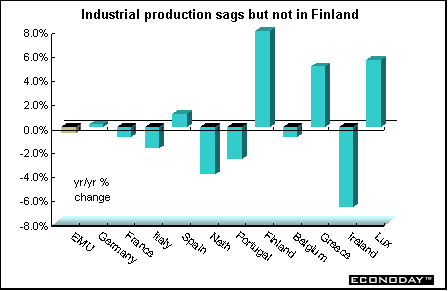
December seasonally adjusted merchandise trade surplus with the rest of the world was €7.8 billion, down from an €8.5billion surplus in November. Both exports and imports fell 3 percent. For the full year 2002, the eurozone recorded a trade surplus of €102.3 billion, more than double the surplus of €49.5 billion in 2001. The improvement in the 2002 trade balance is due to a combination of an import decline of 4 percent and a 1 percent export increase.
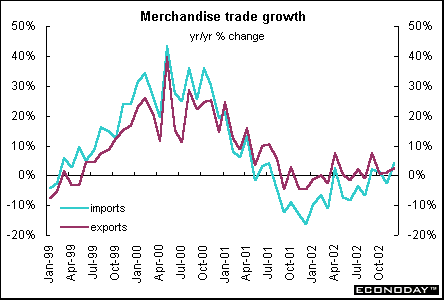
Germany - Center for European Economic Research (ZEW) economic expectations index among German financial experts rose to 15 in February from 14 in January. This was the second monthly increase in a row. But the economic outlook remains fragile and growth is expected to remain weak in the second half of 2003. While the data seem to indicate that pessimism on the German economy may have bottomed out, the current conditions index remained unchanged from January at minus 94.7, the second lowest level in index history. Germany may not yet be out of the woods.
December seasonally and workday adjusted manufacturing orders were revised to a drop of 4.4 percent from the originally reported decline of 4.1 percent. Foreign orders were revised down to a drop of 9.2 percent from an original decline of 8.7 percent, while domestic orders were revised down to a decline of 0.3 percent from an original unchanged reading.
France - Fourth quarter seasonally and workday adjusted gross domestic product rose 0.2 percent and 1.7 percent when compared with last year. Private consumption slowed to 0.4 percent from 0.6 percent reported in the third quarter. Overall investment dropped 0.7 percent for the second quarter in a row. However, government outlays soared 1.1 percent after rising 0.5 in the third quarter. Business continues to draw down inventories. The continuing inventory decline reflects cost pressures on companies along with weak demand expectations.
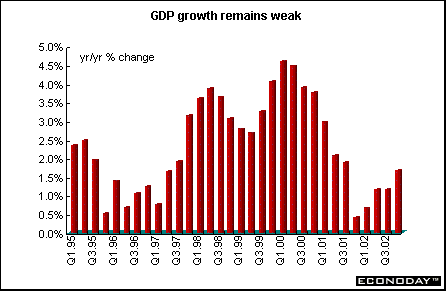
Italy - December industrial orders rose 3.0 percent when compared with last year. Domestic orders rose 6.8 percent while foreign orders sank 2.8 percent. Domestic orders account for around 62 percent of the overall index, with foreign orders making up the rest. For the year 2002, industrial orders were up 1.7 percent compared with 2001, when they dropped 3.5 percent. December seasonally-adjusted orders (which are not followed as closely as the unadjusted figures) fell 0.9 percent from November after rising 2.7 percent in November. December domestic orders rose 2.3 percent on the month, while orders from abroad fell 5.8 percent.
December world merchandise trade surplus shrank to €116 million from a surplus of €1.572 billion a year earlier. Imports rose 6.5 percent while exports fell 0.9 percent. For 2002 as a whole, the world trade surplus slipped to E9 billion from €9.9 billion in 2001. December trade deficit with the EU rose to €1.695 billion from a deficit of €1.244 billion a year earlier. Exports to the EU rose 1.5 percent while imports from the EU climbed 5.4 percent.
Britain - January retail price index fell 0.1 percent but was up 2.9 percent when compared with last year. The retail price index excluding mortgage interest payment (RPIX) also fell 0.1 percent but rose 2.7 percent on the year. January was the third successive month in which RPIX inflation was above the Bank of England's 2.5 percent inflation target.
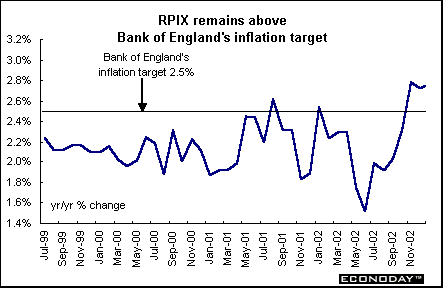
January retail sales fell 1.0 but were up 4.2 percent when compared with last year. Continued retailer discounting helped volumes. National Statistics stressed that caution was required in assessing data around the New Year period, as there were difficulties with the seasonal adjustments. The sales period this January started late compared with the January 2002 period and covered four weeks, from January 5 to February 1. This meant they lost a trading week this year compared to last year, which could have a variable effect on retailers.
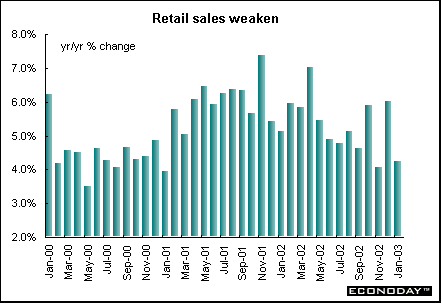
Asia
Japan - December seasonally adjusted tertiary index fell 0.7 percent and 1.3 percent when compared with last year. The tertiary index reflects activity in six industries: utilities, transport and telecommunications, wholesale and retail, finance and insurance, real estate and services. December seasonally adjusted all industry activity index fell 0.6 percent but was up 0.1 percent on the year. The all-industry index is used as a proxy for gross domestic product because it adds industrial production, construction, agriculture and government spending to the tertiary index. Utilities, transportation and communications, and wholesale and retail trade led the declines. December marked the fourth straight monthly decline. Activity was down 0.8 percent in November, 0.3 percent in October and 0.2 percent in September.
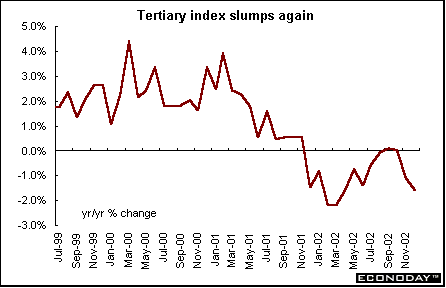
Americas
Canada - December manufacturing shipments fell 0.9 percent due to a sharp decline in motor vehicle and parts industries. Although overall shipments declined for the third consecutive month, the decline was highly concentrated in the transportation equipment sector. Excluding the motor vehicles and parts industries, manufacturing shipments rose a solid 1.3 percent. Only 9 of the 21 manufacturing industries representing 43 percent of total shipments reported decreases. Unfilled orders and new orders were down 1.1 percent and 1.6 percent, respectively. Despite a strong start to 2002, the motor vehicle industry did not end the year on a positive note. Shipments plunged 11.1 percent, the fifth consecutive decline. In addition to the usual seasonal shutdowns at various assembly plants, some manufacturers extended plant closures by a few weeks in an effort to reduce inventories. Partly offsetting the overall decrease in total shipments in December, shipments of petroleum and coal products increased 8.2 percent, wiping out November's 6.8 percent decrease.
December merchandise trade surplus fell to C$4.1 billion from a revised C$4.3 billion in November. Exports fell 0.3 percent while imports rose 0.5 percent. The automotive sector was responsible for the lion's share of this decline, as imports rose strongly and exports fell to their lowest level in more than four years. The trade surplus with the United States rose by C$633 million to C$8.3 billion. Exports fell 0.5 percent while imports from south of the border dropped 3.6 percent. Imports from all other major trading regions posted double-digit increases. This pushed up Canada's trade deficit with countries other than the United States from C$3.4 billion in November to C$4.3 billion in December. Exports of energy products increased 2.0 percent. Natural gas exports to the United States jumped 4.4 percent, as volumes increased and prices fell slightly. Crude petroleum exports rose 8.3 percent to $2.0 billion. The 2002 annual trade surplus with the rest of the world fell to its lowest level in three years, as merchandise exports for the year as a whole declined and imports rose. The United States accounts for 85 percent of all Canada's exports and 72 percent of all imports.
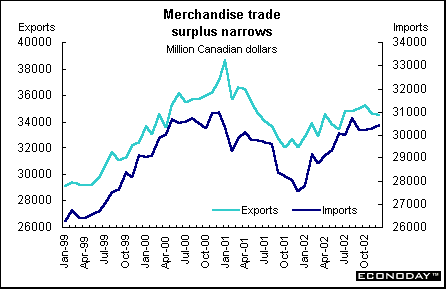
December retail sales edged up 0.2 percent after falling 0.5 percent in November. Sales were particularly strong for furniture stores and auto dealers, while food stores posted moderate gains. All other retailers experienced declining sales. For all of 2002, retail sales rose 6.0 percent from 2001, when sales rose 4.4 percent. Growth in retail sales was sporadic over the course of 2002.
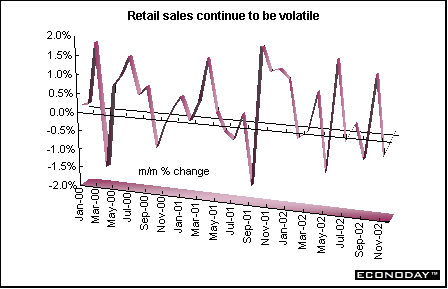


Last Week's Highlights • Global
Stock Market Indexes • Recap of Global Markets
• Currencies • Indicator
Scoreboard

The Bottom Line •
Looking Ahead
|